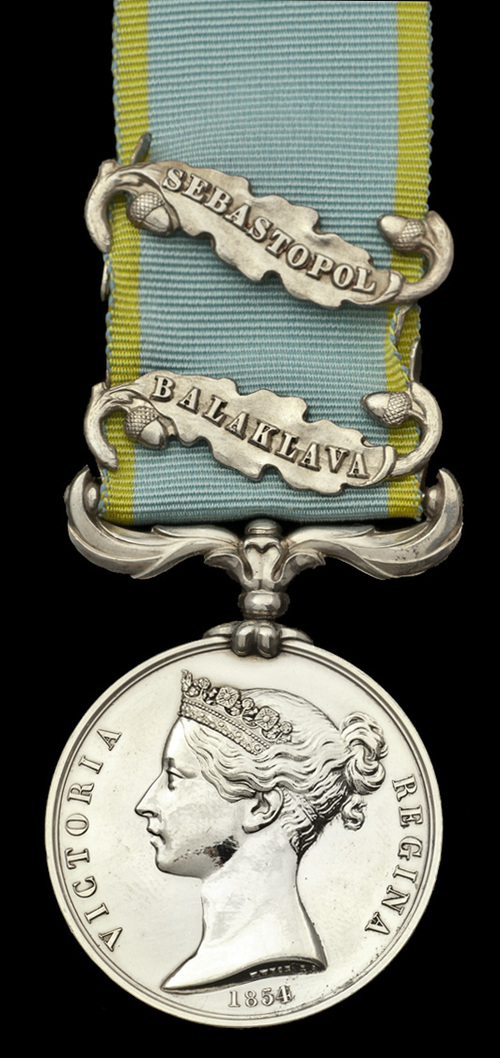
Auction: 15003 - Orders, Decorations, Campaign Medals and Militaria
Lot: 152
A Superb 'Heavy Brigade' Crimea Medal to Captain S.T. Williams, 2nd Dragoons, Who Led a Handful of Men From The Regiment When They Routed a Force of 200 and Captured a Russian General, 25.9.1854; Shortly After This Action He Was Seized With Fever, and Was Only Able to Rise From His Bed Two Days Before The Charge of the Heavy Brigade at Balaklava, 25.10.1854- Still Suffering From His Affliction He Was Carried By Adrenaline Alone As He Led The Second Squadron To Glory. A Month Later His Health Finally Failed Him and His Body Was Conveyed to Scutari For Internment
Crimea 1854-56, two clasps, Balaklava, Sebastopol, second clasp loose on riband, as issued (Capt. S.T. Williams. 2nd. Drgs.), contemporarily engraved in serif capitals, minor edge bruise, otherwise extremely fine
Captain Samuel Toosey Williams, born Faringdon, Berkshire, 1822; educated at Rugby under Dr. Arnold (an exact contemporary of the fictitious Harry Flashman); Commissioned Ensign, 20th Foot, June 1840; transferred to the 47th Foot, July 1840; promoted Lieutenant, April 1842; appointed Extra Aide-de-Camp to Lord Besborough, Lord Lieutenant of Ireland, and retained his appointment under Besborough's two immediate successors, Lords Clarendon and St. Germans; promoted Captain, December 1847; transferred as Captain to the Scots Greys, June 1848; 'Upon his Regiment being ordered to the East he proceeded to Varna. When the army embarked for the Crimea, the Scots Greys followed; but like the other cavalry regiments it was from the very nature of the ground chosen by the enemy doomed to inaction save in reconnaissances. On the 25th September, however, Captain Williams was with the handful of men that surprised several hundred Russians and put them to flight, and on which occasion he captured the Russian General, Cunija. In the following month, from excessive fatigue and privation, he was seized with fever, and was just out of his bed two days before the great battle of Balaklava. On the 25th October, the day on which so many untried men were to win their spurs, the Scots Greys, to their great joy, were ordered to handle the enemy. They obeyed! Captain Williams had the honour of leading the second squadron. How they speeded to meet the foe- how they slashed, cut, thrust, and pistolled the immense masses of Russian cavalry, who were as four to one against our heavy horsemen. In this grand affair Captain Williams covered himself with glory. His swordsmanship stood him in good stead, for no less than four times was he beset, first by six, then three, two, and four of the enemy. Out of that bloody encounter he came without a scratch. How our heavy cavalry escaped is marvellous, for the enemy not only outnumbered it, as already stated, but fought most courageously. On two occasions during the Grey's cutting their way through the massive circle formed round them by the Russian horse, Captain Williams had near paid with his life his devotedness to two privates in his squadron. Out of this carnage came Williams without injury from the enemy. But there was death in him. He should have been in hospital, not in fight. The fever had not left him when he mounted, two days before this huge encounter. Excitement carried him through the fatigue, and a sort of miracle preserved him from the dangers of this fearful cavalry day. The thrill of battle passed, Captain Williams was again attacked with fever, and was seriously advised by the medical men of his regiment to leave the camp for Constantinople, but he refused. He looked upon his illness as momentary, and certain to wear off. His brave heart had deceived him. He could no longer mount the horse so gloriously as he had against the Russians on the 25th October. His end was drawing to a close, not to be put aside by all that pluck and passion for war's grandeur could essay, to reanimate a body exhausted by war's privations. On the 23rd November he died, and on the following day his body was conveyed to Scutari for interment.' (Our Heroes of the Crimea refers).
Whereas the majority of medals to those Officers and men who were either killed in action or died of wounds or disease were issued officially named, a small number of Officer's medals were sent out in advance, either directly to the recipient's family, or to Messrs Hunt and Roskell, to be privately engraved.
Provenance: Christie, November 1987
Subject to 20% VAT on Buyer’s Premium. For more information please view Terms and Conditions for Buyers.
Estimate
£4,000 to £5,000




